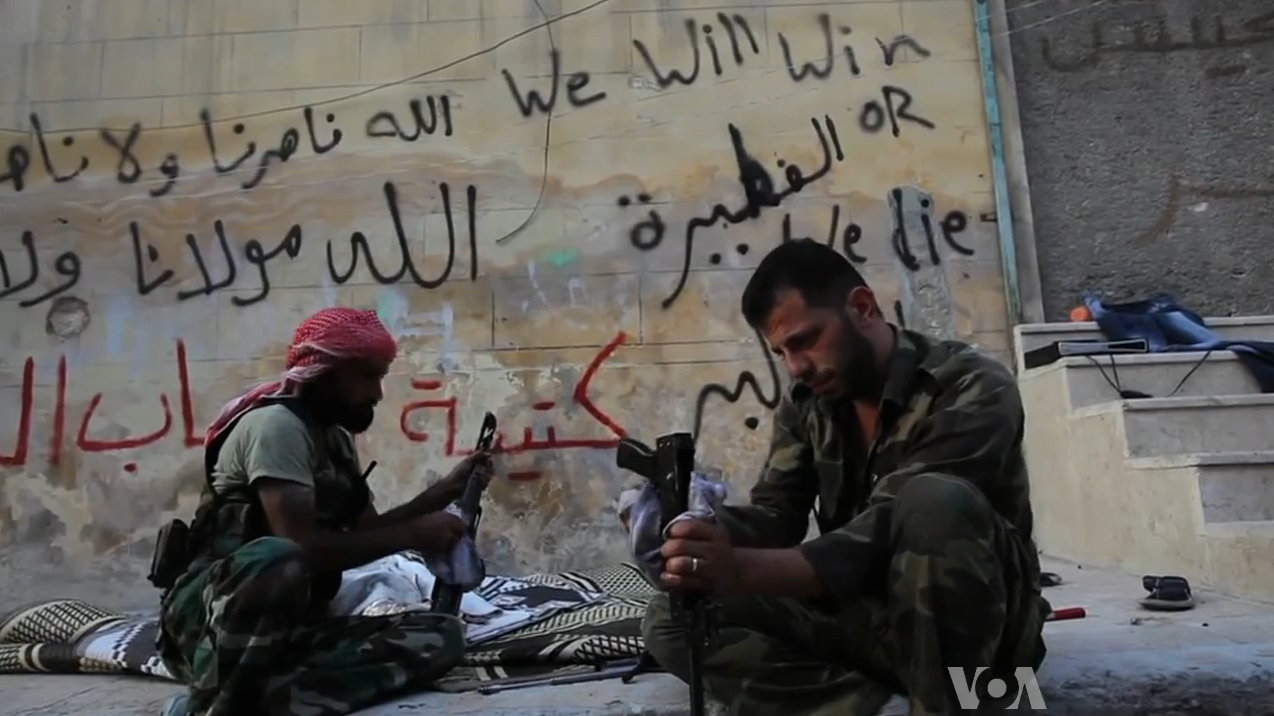
Free Syrian Army rebels cleaning their AK47s, Aleppo, Syria, 2012. (WikiCommons)
Chapter 1: Why are Russian troops in Syria?
Putin has always been in Syria’s civil war.
Long before Bashar al-Assad’s troops fired the first shots that set off the Syrian rebellion, Russia was stocking the armories that assured the Assad family’s minority Alawite sect’s grip on power. When Syrian blood flowed through the streets of Homs and Dar’aa, the backing of Putin shored up Bashar’s rocky international position against international intervention. Later, as irrefutable evidence showed chemical weapon attacks by Assad’s forces on Damascus suburbs still inhabited by civilians, it was Russia’s foreign minister that halted Obama’s bombs.
But in the past fortnight, Putin has decided to get his boots dirty. As a military and diplomatic counterweight to the West, Putin has been unhindered by any thought of negotiations over a nuclear deal and seems to revel in the revived pariah status of a post-Crimea Russia. No doubt boosted by his successes in Crimea and Ukraine, the lack of any substantive and, crucially, unified Western strategy on Syria gifted him the perfect opening for some Levantine realpolitik.
Myth 1: Russia’s principal goal is to fight ISIS
Few believe Moscow’s line that direct Russian involvement in Syria is an effort to subdue ISIS. The predominant targeting of U.S.-backed FSA and other rebel groups rather than ISIS points to this most clearly.
This should be of little surprise, as since the announcement of its engagement in Syria, Russian rhetoric has been couched in Assad’s rhetoric. The ‘terrorists’ label has been liberally pinned to every non-Assad aligned element in Syria, while ISIS’ brutal record has been held up as the just cause for intervention against all of them.
Far more shocking is the evidence showing the Russian security forces have played in bolstering the ranks of Islamists in Syria. The FSB, successor to the KGB (Putin’s old employer), stands accused of facilitating the passage of (primarily Chechen) extremist Islamists from Russia. This is easily read as a savvy tactic to rid Russia of some of its most seasoned enemies by sending them off to die fighting for Islamic State. Taken more cynically, it would also continue a long-held Assad strategy to nourish ISIS and let it both weaken ‘moderate’ opposition forces and legitimize Assad’s position as the last bastion against the ‘terrorists’ that threaten to overrun Syria. Neither supports Putin’s newfound hardline on ISIS. Ironically, this week Roman Kadyrov, Putin’s puppet Muslim leader in Chechnya, pleaded for permission to send Muslim Chechen battalions to Syria to fight Russia’s war.
Myth 2: the Russian intervention isn’t just a last-ditch attempt to save Assad
Russian boots on the ground in Syria points to one fact: Assad is in trouble. Even with the efforts Iranian Special Forces, foreign Shiite militias and Hezbollah forces from Lebanon to shore up Assad’s defences until now, Bashar has been beaten back into a corner. Corralled into the coastal heartland of his Alawite sect, Damascus and the border with Lebanon, a month ago Assad only held lands his enemies knew he would fight to the death for. Within days of Russian strikes, the Syrian Arab Army (Assad’s official force) is on the offensive, moving to retake ground in northern Hama province backed for the first time in four years by effective air support, ably provided by the Russians.
Despite Assad’s precarious position – the Iranians reportedly warned Moscow that his regime would fall soon without their support – it was the Free Syrian Army’s weakness that played into Putin’s hands. Just as western faith in the moderate opposition was, rightly or wrongly, at its lowest following the disastrous American training operations, Russian troops reached Syria. The utter failure to come up with any Western strategy on Syria has provided Putin the perfect power vacuum.
Myth 3: Russia doesn’t have a material stake in the Syrian war
As with any modern military intervention, Russia, as the outsiders, have their own material interests at play in Syria. The Latakian port that Russian ships are currently docking in remains Russia’s only Mediterranean port – a highly valuable resource as access from the Caspian Sea through the Turkish-controlled Bosphorus looks increasingly vulnerable and relations with Ankara nosedive. From a monetary perspective, the loss of influence and trade with Syria if Assad falls would no doubt hurt in the future. More importantly, even with the upsurge in interest in Russian weaponry post-Arab Spring among Middle Eastern leaders from Egypt to Iraq, pre-2011 Syrian purchases of Russian arms were thought to stretch into the billions of dollars. Back in 2011, 600 Russian technicians were reportedly working to renovate the port for Russian ships while Russian investment in the country in 2009 was also estimated at $19.4 billion, not the kind of sums most world leaders would happily write off. As former Soviet allies have faded away, Assad’s Syria remains a bastion of regional support and a key staging post for Russian power globally. It is prize not easily abandoned.
Myth 4: Putin doesn’t have a personal stake in Syria
Ultimately, Putin achieved his victory in Syria as soon as the first Russian plane landed in Tartus. As much as it may irk the West, he has now assured himself a place at the negotiating table. Sidelined by the international community following Crimea’s annexation and notably absent as a nuclear power from the Iran deal, Putin has placed Russia centre stage on the world’s diplomatic stage. Not only will Moscow now have a say in the (inevitably diplomatic) resolution to the proxy war being fought in Syria, through sheer brute force and guile it has retaken its seat at the top table of world power wrangling.
Now that Russia’s green men are on Syrian soil, I wouldn’t expect them to be leaving anytime soon.
